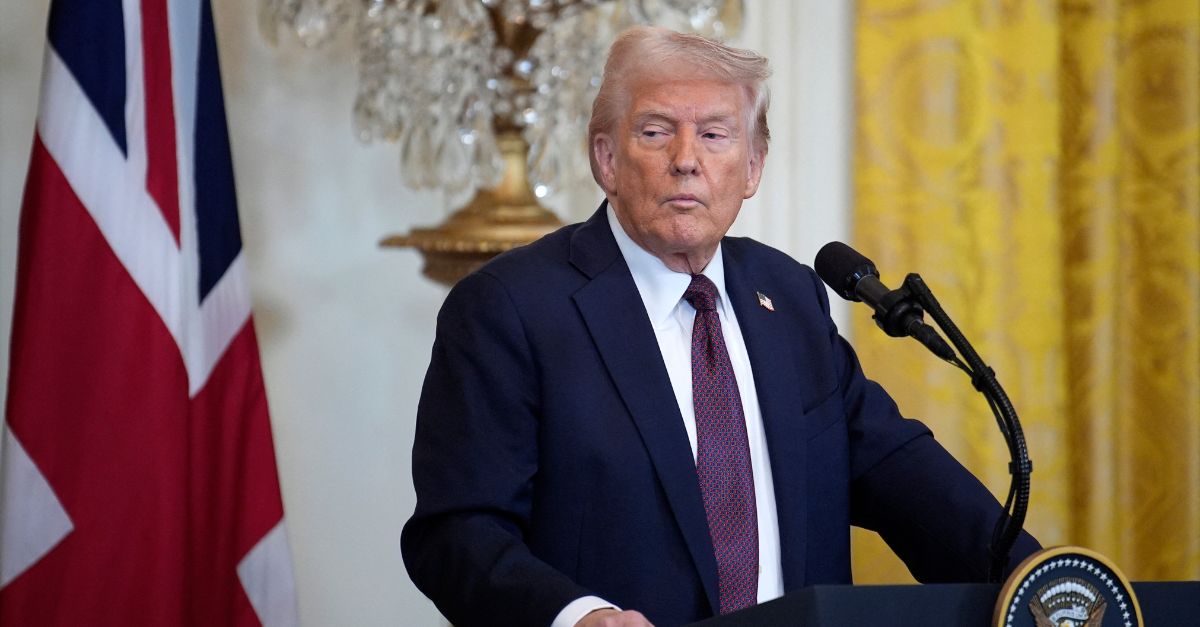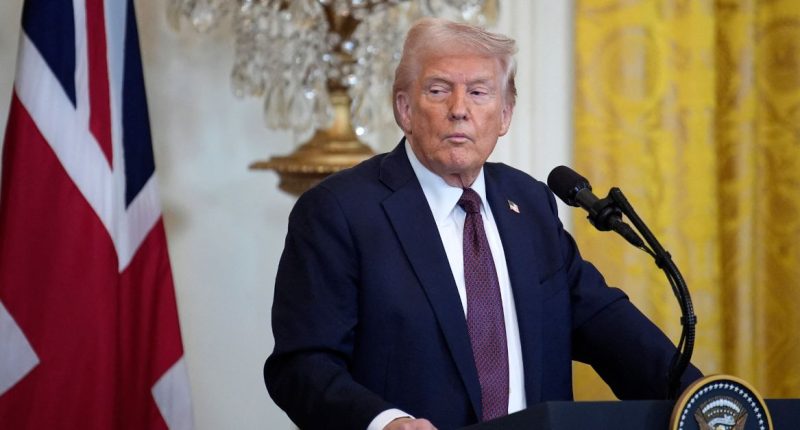
President Donald Trump at a press conference at the White House in Washington on February 27, 2025 (Yuri Gripas/Abaca/Sipa USA; via AP Images).
A federal court of appeals on Monday clarified and reversed itself in the face of an ongoing struggle over the legality of proposed layoffs at the Consumer Financial Protection Bureau (CFPB).
In a 2-1 opinion, the D.C. Circuit Court of Appeals barred the Trump administration from moving forward with plans to fire almost all of the agency’s employees. Those mass layoff plans, the government thought, were previously allowed by the same appellate panel.
But a promised wave of firings never took effect.
In a hastily-assembled hearing and subsequent bench ruling, U.S. District Judge Amy Berman Jackson, a Barack Obama appointee, suggested the government had not complied with previous court orders in a case brought by CFPB staff trying to keep their jobs.
Now, the appeals court has sided with the lower court by recognizing that its own ruling injected some measures of uncertainty into the dispute and partially lifted its earlier partial stay.
The underlying case is currently governed by a preliminary injunction with eight specific provisions; the appeals court recently stayed three of those provisions, limited by certain clarifications.
Of particular importance is the third provision.
On April 11, the appeals court modified the third provision of the preliminary injunction to allow the government to perform a so-called “reduction in force” (RIF) of employees determined “after a particularized assessment to be unnecessary to the performance” of the CFPB’s statutorily-mandated duties.
In turn, the Trump administration took the court’s permission slip and ran, aiming to dye it pink at scale. On April 18, the government used the panel’s order to try and fire between 1,400 and 1,500 employees, which would have eliminated some 90% of the agency’s workforce.
On April 19, the lower court stepped in and blocked the layoffs.
The government quickly filed an emergency motion with the court of appeals to enforce or clarify its earlier order.
First, the court issued the requested clarification.
“Such a ‘particularized assessment’ involves a determination, conducted by the decisionmaker responsible for the RIF, that each division or office within the Consumer Financial Protection Bureau will be able to perform any statutorily required duties of that division or office without the employees subject to the RIF,” the per curiam opinion explains.
But, at least for now, that asked-for definition will prove unavailing and somewhat superfluous for the government because the same group of judges who gave the Trump administration the go-ahead to fire CFPB staff have taken that permission away.
From the opinion, at length:
The parties vigorously dispute whether this language permits judicial review of the questions whether the assessment at issue was “particularized” and whether the employees subject to the RIF are “unnecessary to the performance of defendants’ statutory duties.” Defendants further argue that any such judicial review would make the injunction impermissibly vague. In response, plaintiffs highlight that the proposed RIF currently at issue, involving nearly 90 percent of agency employees, exceeds the scope of the RIF that prompted the district court’s original preliminary injunction. Given these ongoing disputes, we think it best to restore the interim protection of paragraph (3) of the preliminary injunction, which ensures that plaintiffs can receive meaningful final relief should the defendants not prevail in this appeal, rather than continue collateral litigation over the meaning and reviewability of the “particularized assessment” requirement imposed by this court’s stay order.
The court tried to preempt grousing from the Trump administration by noting that other legal issues implicated in the case, like separation-of-powers arguments, will be dealt with in due haste.
“[W]e have already accommodated the government’s interests by substantially expediting the appeal, with oral argument scheduled less than three weeks from today,” the order goes on. “For these reasons, paragraph (3) of the preliminary injunction under review is now effective pending further order of this court.”
Love true crime? Sign up for our newsletter, The Law&Crime Docket, to get the latest real-life crime stories delivered right to your inbox.
In a dissent, Circuit Judge Neomi Rao, who was appointed by President Donald Trump during his first term, bemoans how the CFPB’s “political leadership” is barred from “reducing its workforce in accordance with President Trump’s directives.”
The dissent argued that the plaintiffs, the National Treasury Employees Union, went back to the district court too soon.
“But the plaintiffs did not allege they had suffered any specific harm or loss of service from the RIF,” Rao writes. “Nor could they, since the employees subject to the RIF had not yet stopped working, much less been terminated.”
Rao writes that Jackson’s injunction and resulting intervention created “a preclearance regime whereby the CFPB must obtain judicial approval for its management decisions.” That, the judge in the minority says, “turns the separation of powers on its head.”
The dissent sees a cascade of mistakes with each ensuing judicial brake on the power of the executive in the case.
“In my view, the district court’s modification of the injunction is inconsistent with the terms of this court’s April 11 stay and therefore an abuse of discretion,” Rao writes. “The district court overstepped our stay. Rather than remedy the judicial error, today’s order hamstrings the Executive and prevents the CFPB from downsizing until the merits of the appeal are resolved. The lack of judicially manageable standards in this posture is a reason to leave execution of the laws to the Executive, not the courts.”







